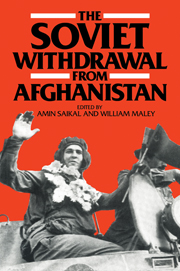Book contents
- Frontmatter
- Contents
- Preface
- 1 Introduction
- 2 The Geneva Accords of April 1988
- 3 Post-Withdrawal Afghanistan: Light at the End of the Tunnel
- 4 The Regional Politics of the Afghan Crisis
- 5 The Afghan Conflict and Soviet Domestic Politics
- 6 The Soviet Armed Forces and the Afghan War
- 7 Afghanistan and Soviet Alliances
- 8 Afghanistan and Sino-Soviet Relations
- 9 The Afghanistan 'Settlement' and the Future of World Politics
- 10 Conclusions: Management of the Afghan Crisis
- List of Contributors
- Index
10 - Conclusions: Management of the Afghan Crisis
Published online by Cambridge University Press: 09 November 2009
- Frontmatter
- Contents
- Preface
- 1 Introduction
- 2 The Geneva Accords of April 1988
- 3 Post-Withdrawal Afghanistan: Light at the End of the Tunnel
- 4 The Regional Politics of the Afghan Crisis
- 5 The Afghan Conflict and Soviet Domestic Politics
- 6 The Soviet Armed Forces and the Afghan War
- 7 Afghanistan and Soviet Alliances
- 8 Afghanistan and Sino-Soviet Relations
- 9 The Afghanistan 'Settlement' and the Future of World Politics
- 10 Conclusions: Management of the Afghan Crisis
- List of Contributors
- Index
Summary
The earlier chapters in this book demonstrate the range of issues and uncertainties which are posed by the Soviet withdrawal from Afghanistan. The interrelationships of the internal, regional and global options are exceptionally complex. There is, however, a wide measure of agreement on the initial premise that, while the Soviet commitment to withdraw constitutes a major turning point in a protracted conflict, it falls far short of a settlement or termination of that conflict.
The purpose of these concluding comments is to identify areas of agreement which emerge from the discussion, to explore some of their possible implications, and to highlight major uncertainties and differences of opinion. I have also been asked to comment on the management of the crisis, and although the concept of ‘crisis management’ is highly problematic, there may be something to be learned from focusing on this aspect of the Afghan conflict.
If we draw the comparison with Vietnam which has arisen in several other contexts, what stands out is the relative simplicity of the ‘management’ problem in the earlier case, that is to say the relatively small number of the key actors and the relatively centralised character of their decision making structures. This is especially striking if the negotiation of the Paris settlement between Henry Kissinger and Le Due Tho is contrasted with that of the Afghan Accords. In the former case the negotiators represented the governments of the principal military adversaries, which determined the outcome for their South Vietnamese clients, who themselves had no independent role in the process. The roles of the Soviet Union and China, while undoubtedly significant, remain somewhat enigmatic.
- Type
- Chapter
- Information
- The Soviet Withdrawal from Afghanistan , pp. 161 - 170Publisher: Cambridge University PressPrint publication year: 1989



